Do you own up to your actions? Do you ever feel personally responsible for your life? Responsibility is a heavy word and personal responsibility can be seriously challenging. But it is also the secret to success and happiness.
What is personal responsibility?
Personal responsibility refers to our ability to choose, manifest, change and control our own life. It means that we socially acknowledge the fact that we are morally and legally accountable for our actions and their consequences. However, this can be easier said than done as various factors, like early childhood experiences, tend to influence our ability to be responsible. In fact, studies have found that adverse childhood experiences, such as parental maltreatment, can significantly impact adulthood personality traits. Hence, we may consider certain mitigating circumstances for our behaviors.
Regardless, understanding personal responsibility meaning and being responsible is crucial as it impacts our thoughts, words, behaviors, actions, decisions and choices. Moreover, it allows us to be self-aware and prevents us from blaming others for our own mistakes. Perhaps, this is the reason why taking personal responsibility feels so challenging. It makes us look away from external factors, kicks our victim mentality out of the window and compels us to understand what we may have done wrong. And that can be hard for most of us. However, on the flip side, when you ARE personally responsible, you can take better control of your own life and your physical & mental health. It makes you more confident, conscientious and honest.
Read also: How You Screw Your Own Happiness, Based On Your Myers-Briggs Personality Type
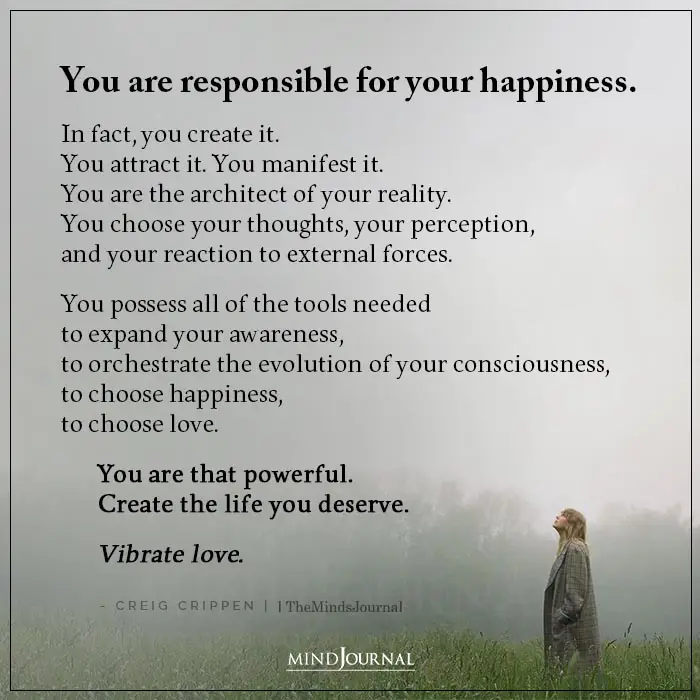
Do we have to take personal responsibility?
I mean, is it really that important? Some people seem so happy blaming others for their own mistakes. Why do YOU have to be so morally and legally accountable and liable for yourself? Why is taking personal responsibility important? What’s the big deal, right?
The big deal is the dramatic change you will observe in your life once you start taking responsibility. By owning up to your actions and their consequences, you take charge of your life. You drastically shift your perception of reality and play an active role in the formation of your environment. This not only affects you positively, but others around you as well. It takes strength and courage to stop making excuses and take personal responsibility. This helps to rebuild your personality and character driving you towards personal growth.
When we avoid individual responsibility, we trap ourselves in an endless poisonous loop of self-victimization, blame, self-criticism and shame. We lack self-awareness and self-acceptance which affects our self-esteem and confidence. We not only break our connection with our positive self, we become detached from others who challenge us to be better. But you can strengthen that connection and rewrite your entire story simply by learning how to stop making excuses and being more responsible. Responsibility indicates choice – a choice to respond to challenges positively. It puts you in charge of the show. It empowers you to avoid negative thoughts and emotions, like anxiety and depression. Moreover, studies show that personal and social responsibility positively influences our basic psychological needs, motivation and our intention to be physically active. In fact, research has also found that individuals with personality traits that make them more responsible experience higher levels of success and life satisfaction. That sounds like a big deal to me.
Why we lack personal responsibility
There is no specific reason why we deny personal responsibility. For some it can be an intense fear of failure or conscious or unconscious self-denial, while for some others it can be poor habits or even laziness. However, most of us often feel overwhelmed when we are asked to take responsibility for ourselves as we feel we are not capable of dealing with the scope of the situation. This can stem from a lack of self-confidence, poor self-esteem and self-doubt. Lack of self-awareness also plays an important contributing role here. Influenced by our distorted beliefs and perceptions and motivated by a lack of connection with our core values and needs, we evade personal responsibility as we lack a strong sense of self-worth. As we feel we have no control over our lives, we start believing that we are not important enough. This further eats away our motivation to take charge of our lives.
Read also: What 12 Step Programs Can Teach You About Dealing with Chaos
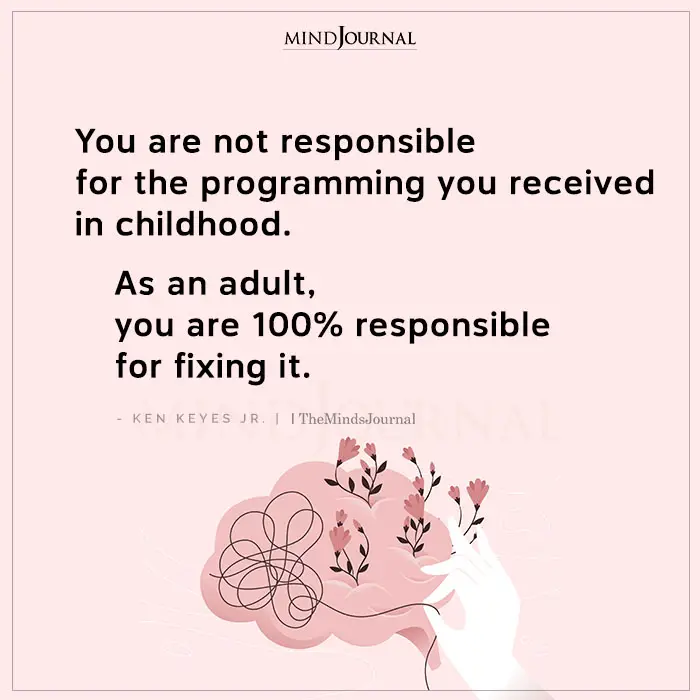
Are you avoiding self-responsibility?
If you are wondering whether you are being responsible enough for yourself or not, here are some signs of avoiding accountability that you need to watch out for –
- You have a victim mentality and feel victimized & powerless even when it’s your own fault.
- You are prone to shifting blames on others when things go wrong, whether deliberately or unintentionally.
- You tend to make up excuses frequently in negative situations to shirk personal responsibility
- You love to complain….a lot as it is easier than taking charge and fixing your life.
- You desperately avoid challenges & risks and look for people who can help you overcome this.
How can I take responsibility without making excuses
So how do you take personal responsibility and stop blaming circumstances? If you believe you need to take more personal responsibility but not really sure how to deal with the challenges, then here are a few beneficial ways to help you get started with accountability:
1. Identify how you avoid responsibility
We all avoid responsibilities at times. But all of us have unique patterns through which we bypass accountability. Recognize the triggers that lead to self-denial or blame shifting. Introspection and journaling for 10 minutes daily can help you understand what motivates you to avoid taking responsibility. Once you know the triggers, you can work on overcoming them.
2. Stop blaming others
Yes, blaming someone else for your mistakes is super easy, but it also keeps you from improving yourself. Playing the blame game reinforces your victim mindset and stops you from bringing actual change to your environment. So instead of pointing fingers at others, pause, breathe deeply and take charge of your life by shifting your mentality to being a victor, not a victim.
3. No more complaining
“Excuses are monuments of nothingness, They build bridges to nowhere, Those of us who use these tools of incompetence, Seldom become anything but nothing at all.” – Unknown
Let’s face it, complaining about life and making excuses never got anyone anywhere. You can nag all you want and blame as many people as you like, but that won’t bring even an ounce of positive change to your life. Complaining traps your mind into thinking about what you don’t have instead of what you do have. This is known as the scarcity mindset. Studies have found that “a scarcity mindset affects neural mechanisms underlying goal-directed decision making.” This is why you need to shift your mentality towards an abundance mindset which makes you believe that there are adequate opportunities for you and drive you to be more responsible to tap into those opportunities.
Research shows that people with a growth mindset “are better able to bounce back from failures” than those who complain about what they don’t have. So the next time you observe yourself complaining, pause and change your thought process and perspective.
Read also: 8 Things You Should Stop Expecting From Others
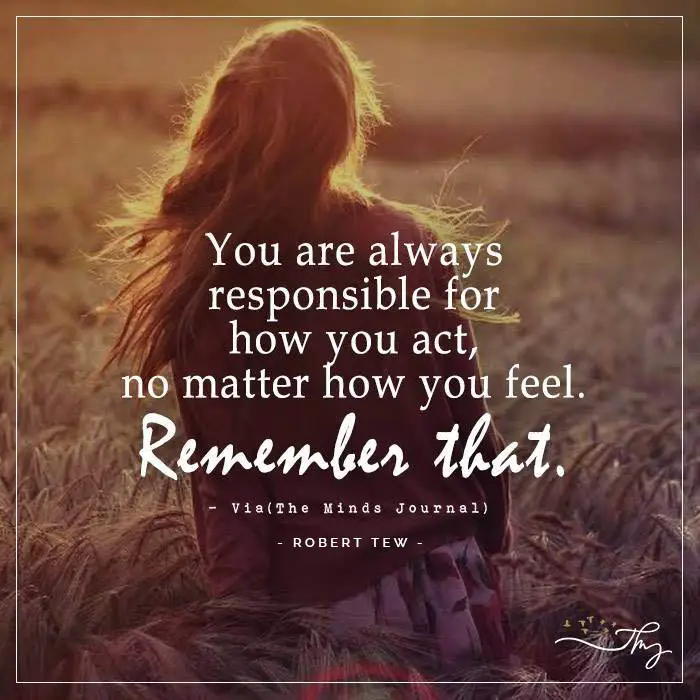
4. Develop self-awareness
Learn how to be more aware of your thoughts, emotions, behaviors and actions. This will enable you to make conscious choices that will drive you towards your goals. Self-awareness can not only help you take more personal responsibility, it can also help you build your self-esteem by accepting your flaws and imperfections. This will encourage you to work on your negative aspects and make you feel more empowered. So take intentional steps to become increasingly aware of your words & actions and their consequences.
5. Live mindfully
Mindfulness is the art of living in the present moment. Our negative emotions, such as anger, blame, shame, self-hatred and poor self-esteem lead to high levels of stress and anxiety. This can make us forget the fact that life is happening NOW. It is unfolding right this very moment. When you are too focused on how external factors are more powerful than you, you miss out on what life has to offer you at this very moment. Being mindful allows you to realize that only you can control your present. It helps you to accept what life offers you, both positive and negative, and make the best out of it. So take personal responsibility only for this moment so that you can redeem your past & build your future without feeling overwhelmed.
According to a 2012 study, mindfulness, the practice of bringing your attention to the current moment, helps to reduce stress, improve mental health, develops self-awareness & self-regulation & self-transcendence and “reduces biases related to self-processing.” A great way to be more mindful in life and exist in the present is to start practicing mindfulness meditation for 10 minutes daily.
6. Be intentional
Make deliberate choices in life. Be intentional in your decisions and actions and make sure your choices are goal-driven. Intentional living can help manifest your dreams by taking responsibility consciously for your education, work, relationships, health and life.
Take charge of life
“When we have begun to take charge of our lives, to own ourselves, there is no longer any need to ask permission of someone.” – George O’Neil
Responsibilities can be scary, painful and even embarrassing. But it can also help us become humble, honest, confident and trustworthy. Personal responsibility is a choice that we make to own our happiness. It means not blaming others for our own mistakes. It means learning, growing and empowering ourselves. It means you have the strength to overcome challenges and control your emotions regardless of external circumstances. This is your key to self-actualization, success and inner happiness.
Read also: Gestalt Therapy: 5 Popular Techniques That Encourage Healing and Personal Growth
Frequently Asked Questions (FAQs):
How can taking responsibility be empowering?
Being able to take personal responsibility can empower you by helping you realize that your thoughts, emotions, behaviors, actions and reactions are always in your control. When you don’t blame others for failures or mistakes, you can find your way to success.
What happens when you don’t take responsibility?
When you refuse to or are unable to take responsibility for your behaviors and actions, then you are going to have a strong negative impact on your family, friends, coworkers and other people around you. It will not only affect your relationships, but also your ability to socialize with others and build new relationships.
What does personal responsibility look like?
A person who is responsible is seen as trustworthy, dependable, honorable, confident and upright. It means not making excuses for your mistakes, not blaming others or pointing fingers, and accepting the consequences of your actions. It means having faith in yourself.

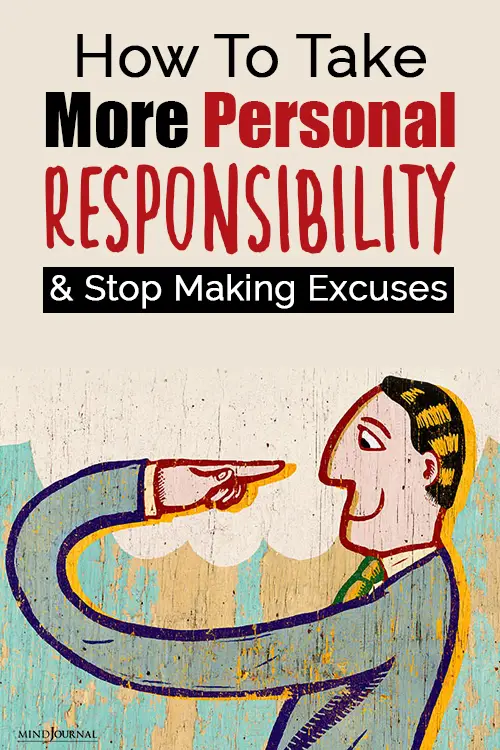
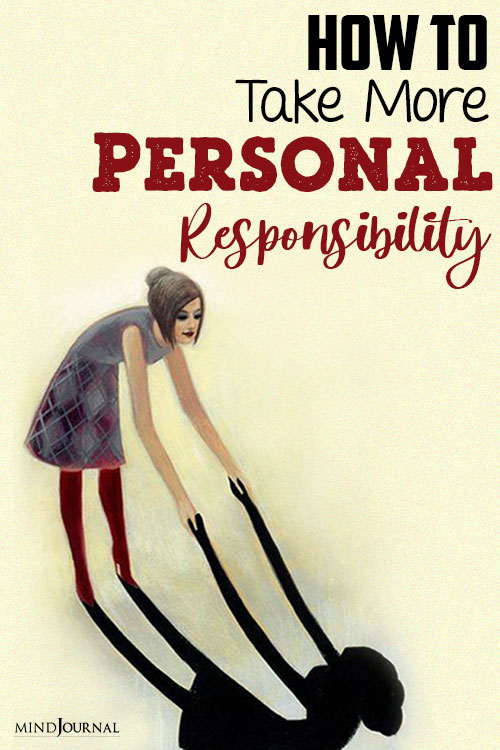
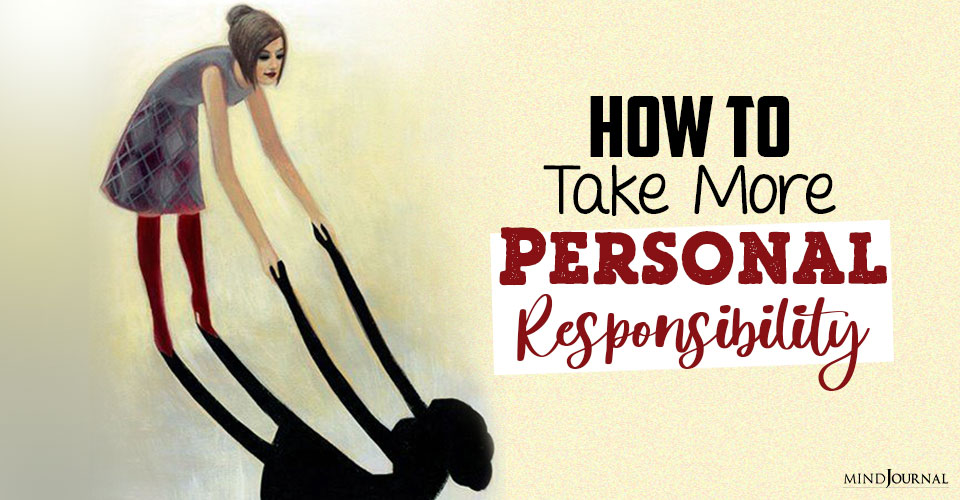







Leave a Reply
You must be logged in to post a comment.